The New Freedom Trail
This article first appeared in the April 2022 issue of Adventure Cyclist magazine.
For many bicycle travelers, the possibility of individual transformation is key to an adventure. Many people in the bike travel community are very aware of the ability for the bicycle to create social change. That’s the mission of Bikes Not Bombs (BNB) in Jamaica Plain, Massachusetts: to use the bicycle as a vehicle for social change in order to achieve economic mobility for marginalized people in Boston as well as the Global South.
This summer, Bikes Not Bombs’ On-the-Bike Program and Adventure Cycling’s Bike Overnights are partnering on a project for youth apprentices to adventure by bike and experience bike travel for the first time as they engage with and learn about social justice movements in their own Boston communities.
Joseph Pires is a senior youth apprentice at Bikes Not Bombs. Youth apprentices begin their employment in Bikes Not Bombs’ bike school, where they learn the mechanical skills they need to graduate into work for the organization. Youth Apprentices are then employed in the bike shop, as Bike School instructors, in international shipping and recycling operations, as well as in BNB’s community advocacy group, Bicyclists Organizing for Community Action. Joseph is the youth apprentice responsible for spearheading the project.
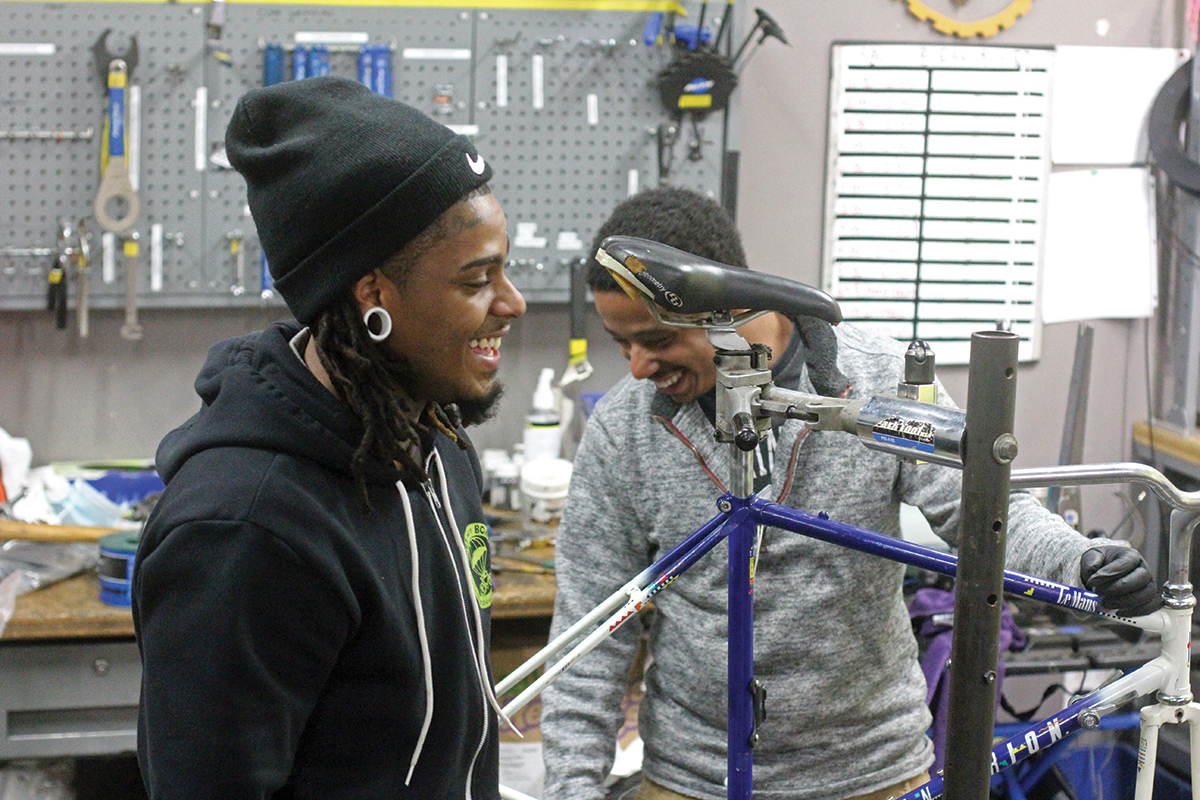
“Oftentimes when you live in a city, that sense of discovery is stunted, especially when you live in certain neighborhoods and you don’t have as many outlets for positive engagement,” said Pires. “Whether it be with other people or within the environment you’re in, so oftentimes kids tend to stay within their neighborhood and forget there’s a place outside their neighborhood, there’s a whole world outside their neighborhood. So they lack trying to make new discoveries, or the ability to learn new things.”
Pires, together with Bike School coordinator Tess Stogner, developed the proposal for the project after Bike Overnights reached out to them. Stogner began bikepacking in college and worked leading bikepacking trips for teenagers before working at Bikes Not Bombs.
“It took being in a community in my life [that] said, ‘This is something you can do,’ to help me believe I could do this,” Stogner said. “It profoundly changed how I see the world now, and find community. This can be something that gives them a lot of joy.”
Two main components of the Bike Overnights program are community-created short routes and supporting beginner bike adventurers who are from communities of color, LGBTQIA+ communities, and women. Together, Pires, Stogner, and Bikes Not Bombs have created an experience combining the two — a powerful project with a wide-reaching impact.
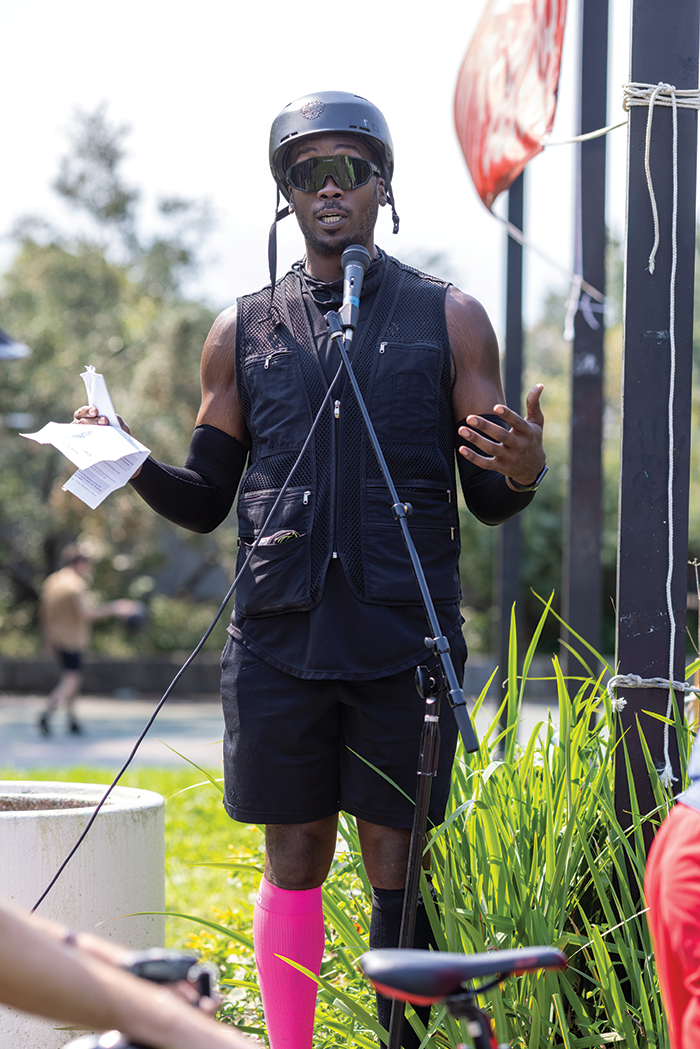
In 2021, the first year of the Bike Overnights project at Adventure Cycling, Bikes Not Bombs began the first part of its project: creating a short route. The route will highlight the whole history of the area beyond Paul Revere and the Tea Party. It will ride through residential neighborhoods while showcasing the strength rooted in those streets that’s never talked about. From Mattapan, Dorchester, and Roxbury to Blue Hills Reservation and Wompatuck State Park, On-The-Bike hopes to tell the story of these places through the lens of past and ongoing social justice and resistance movements.
“The more Joseph and I looked, the more we found. There’s just a wealth of resistance movements throughout Boston’s past and present,” said Stogner, describing their research and planning process. “Understanding the hidden histories and legacies of this city has definitely changed the way I see it, and I will continue to learn from this experience, especially as we begin troubleshooting the route and test riding it in the spring.”
For Pires, the intentionality of planning the route for riders, especially young people of color, to engage with how they fit into their community by looking at the past and present is key to the success of the route, the trip, and the youth apprentices.
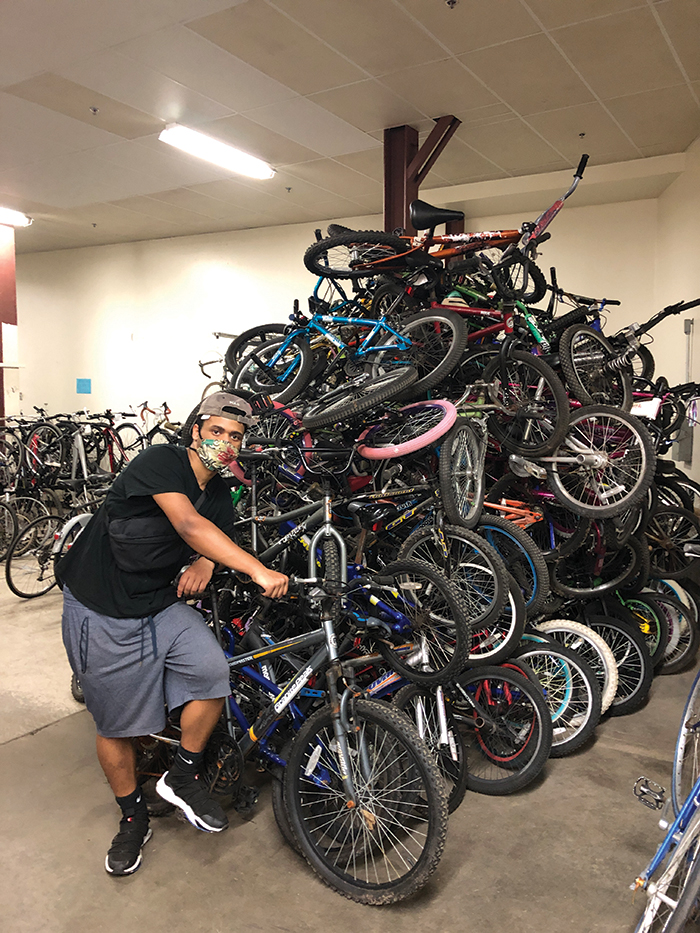
“I’m trying to get people to think more fondly of history and how they can be a part of their own history and make new steps that others can follow,” said Pires. “They can say to themselves, ‘Hey, this is pretty cool!’ They can begin this line of teaching other people and letting them discover new things and new environments.”
The route kicks off at Bikes Not Bombs’ bike shop in Jamaica Plain and rides through Roxbury, visiting sites such as Saint Mark’s Social Center, a hub for the Freedom Schools during the Civil Rights Movement, and the Dudley Street Neighborhood Initiative, a pioneering land trust responsible for making affordable homes available to the community since the 1980s. The first day ends at Ponkapoag Campgrounds in the Blue Hills Reservation.
On Day Two, riders head out from Ponkapoag to Wompatuck State Park Campgrounds, through Weymouth, where they will discuss the English colonization and systemic killing of the Massachusett Tribe. The last day starts with departing Wompatuck to pedal back through Mattapan and Dorchester, with visits including the District Courthouse (a gathering place for many anti-Vietnam protests) and the Laura Ann Ewing Home (a focal point of the consequences of Boston’s ongoing red-lining and gentrification). The ride will end at Dorchester Heights to savor the experience and enjoy a skyline view of Boston.
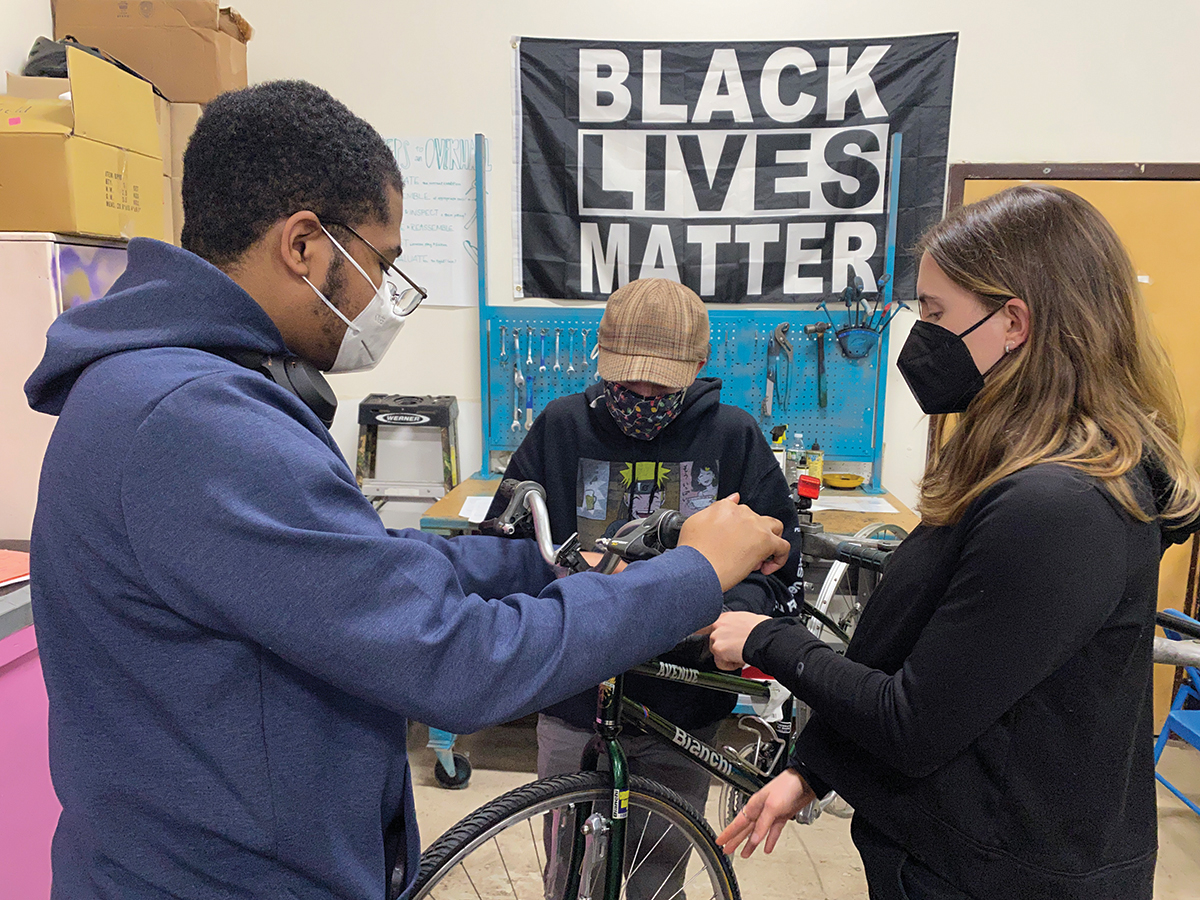
On-the-Bike from the beginning
Getting ready for a bike adventure, whether it’s the first time or the 50th, sometimes comes with preparation or training prepackaged. You can buy a route or find some ideas already traversed online.
After Bikes Not Bombs completes and tests the route, the final piece of the project is a Bike Overnights trip for the 2022 Bikes Not Bombs summer On-The-Bike program participants. On-The-Bike at Bikes Not Bombs offers inexperienced cyclists ages 12 through 18 the opportunity to learn safe riding skills.
“The goal of On-The-Bike is to make cycling through the city safe and accessible despite any potential obstacles,” said Stogner. Alongside learning commuting and riding skills, youth learn basic bike maintenance alongside principles of awareness. These skills will translate into youth finishing their program by riding the Bike Overnight route. They’ll ride two nights, covering about 25 miles a day. No small feat for someone just beginning their love of the bicycle.
“Our roads are made for cars and not cyclists or people who ride bikes,” said Stogner. “For our On-The-Bike students, some people have learned how to drive a car and some haven’t, and explaining the rules of the road can be very abstract and hard to grasp.” Riders on their first Bike Overnight will practice experiential learning through the collective problem-solving that occurs spontaneously en route.
Riders will also be able to train and practice an important skill to bike touring, as well as riding defensively in general: helping lead and keep a ride safe.
“One of the most difficult things to kind of get yourself down from such a long time of doing it and teaching other people how to do it in the correct way is corking and marshalling,” noted Pires. He’s an experienced ride leader and marshal, having taught other riders these skills at Ride for Black Lives Boston. “The more you do it and the more you know what to look for, it kind of becomes like second nature, and you kind of know when to take action when you see something from the slightest turn or the slightest hint of a signal whether it’s from a car or traffic light.”
“Obviously, we have a big responsibility when marshalling. It’s the safety of everyone, whether it’s the ride leader or the last child in the back of the line of us biking,” he added.
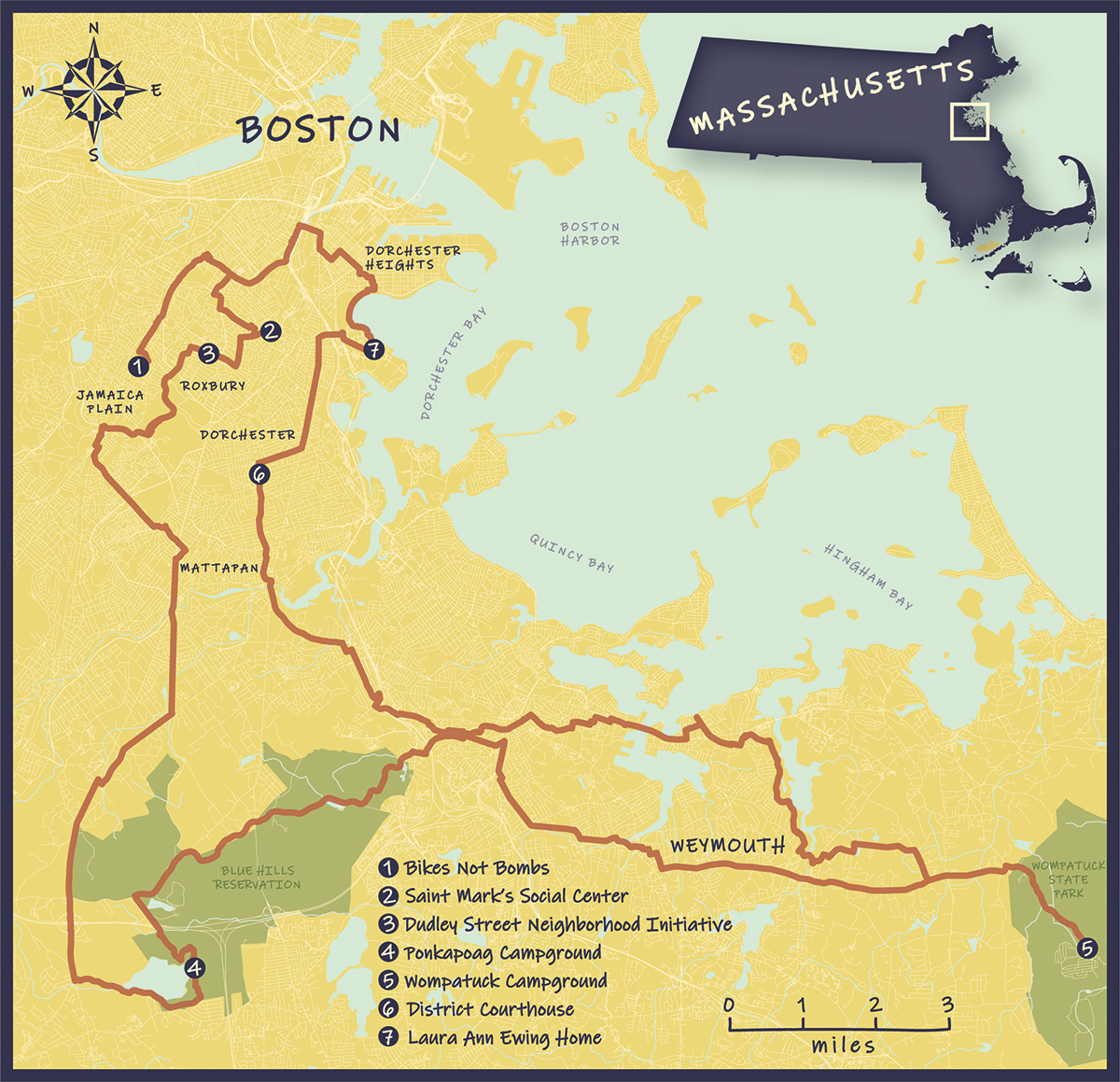
Prepping for a lifetime of bike adventure
An experienced adventure cyclist’s preparations might include a shakeout, testing all the gear they own or trying a new energy waffle to see how it fares. But the young riders of On-The-Bike on this Bike Overnight will get to experience bike travel as real beginners in almost every sense of the word.
“Adventure Cycling Association providing this opportunity through overnight trips extends an opportunity to a student or a person that normally wouldn’t do it by themselves,” said Gary Chin, director of community engagement at Bikes Not Bombs. “I know I certainly wouldn’t! Even at my age and as an experienced bicyclist, I wouldn’t go out to an unfamiliar place by myself and I wouldn’t know if I’m necessarily getting a historical tour right or not. I wouldn’t know if I’m doing the whole camping thing right. And I wouldn’t even want to do it by myself. There’s truth to the expression, ‘There’s power in numbers.’”
Collaboratively creating a route upholding the values of Bikes Not Bombs and learning bike skills in a group is precisely the type of beginner-friendly setting the Bike Overnights program wants to encourage, support, and help empower to grow.
Adventure Cycling, as a venerable and large part of the bike travel community, began the Bike Overnights (Short Trips) program in 2021. Bike Overnights wants to increase access and inclusion in adventure cycling, ensuring that beginners are welcomed, especially cyclists from marginalized Black, Indigenous, and People of Color, women, and LGBTQIA+ communities. Focusing on short, accessible trips, Bike Overnights hopes to create more short routes available to anyone who wants to try adventure cycling in their own backyards, as well as share and support community rides over less than four days, with less than 60 miles of riding per day.
Partnerships with groups like Bikes Not Bombs are key to engaging, impacting, and expanding the Adventure Cycling community. “Bikes Not Bombs is answering a very important question of the 21st century, which is: how do we make transportation sustainable and accessible for all people?” said Stogner. “Having people you trust and a community you trust, that’s essential to being able to step outside of your comfort zone especially in places where, historically, people haven’t been welcome.”
“Bikes Not Bombs extends the view of what a typical cyclist is,” said Chin. “People ride bikes every day in all sorts of weather and all terrain. I think if people start to shift their definition or expectation of what a cyclist is, you’ll start to realize there’s so many people around using bicycles in so many different ways.”
For Stogner, bikepacking in college helped her find confidence and community, which led to a job leading bikepacking for teenagers. “The students on those trips — who were, for the most part, strangers to one another — developed such a strong sense of belonging through the adventures of being out on the road together. When you know how that feels, you can’t lose it; you take it with you wherever you travel next. Even when unexpected obstacles arise (and they always do), you have to face them head on to make it to where you need to go. I’ve learned invaluable lessons in leadership, self-reflection, trust, and teamwork through those experiences.”
As spring arrives, Pires will continue testing the ride to make sure it’s ready to go for On-The-Bike participants. There will still be, of course, much to prepare for. Bike Overnights’ support will help participants succeed on the trip, but as many know, gathering gear is no small task (nor is it an inexpensive one!). Staff will support the ride both on bikes and with support/gear vehicles. Adventure Cycling will be checking in as the weeks go by and release the Bike Overnights route soon for all to enjoy.
“The Bike Overnight and the ride that we planned together is so long and has a lot of distance, and there’s so many things within the route that people can learn,” said Pires. “I think the sense of achievement that will come from that challenge, that will come from biking such a long distance and learning so many things, is really gonna make an impact.”
For Pires, who sees real-time community building, networking, and access to the joy of the bicycle at Bikes Not Bombs from volunteers, staff, and youth alike, Bike Overnights is one more way to discover “new people and new friendships and new bonds.”
“I hope that challenge and sense of achievement will create a space where the people who go on this ride will tell their friends, ‘Me telling you won’t do this any justice, you need to experience this for yourself.’ And I think that’s one of the key things I’m looking to get the kids to do, really just pass on the information and try and pass on that it’s a really important experience and they should experience it for themselves.”
Which is exactly true about any bike adventure — and why Bike Overnights and Bikes Not Bombs are going to get young people experiencing it for themselves.
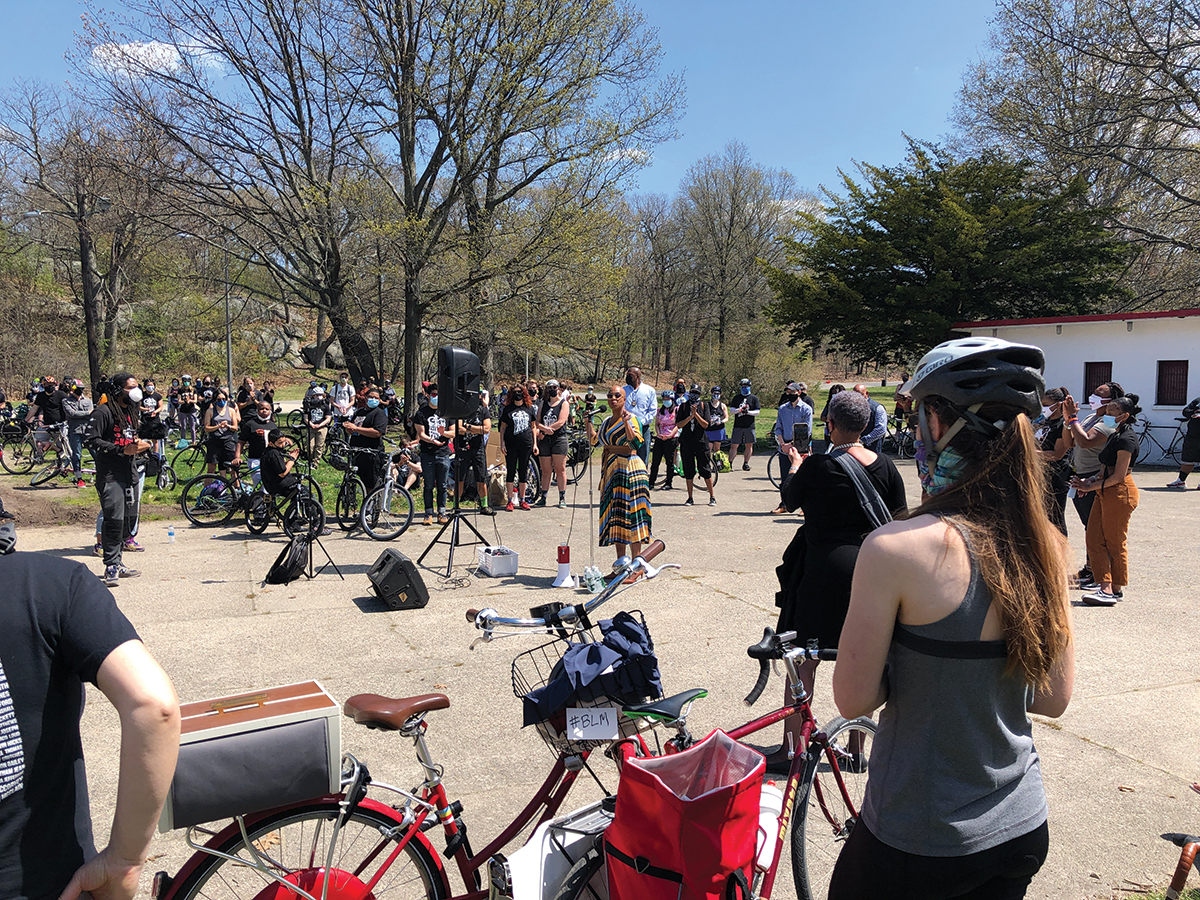
Nuts & Bolts
On-the-Bike
About BNB
Bikes Not Bombs’ work started in 1984 with a shipment of two bikes to Nicaragua. They’ve since shipped over 80,000 bicycles and started Youth Pathways employment and training programs, as well as a full-service retail bike shop. For more information or to help, visit bikesnotbombs.org/donate to help cover the costs of helmets, bike refurbishments, and other needs.
Boston
For more information on this historic city, check out A People’s Guide to Greater Boston by Joseph Nevins, Suren Moodliar, and Eleni Macrakis, published by the University of California Press (2020). More information and extended text can be found at bostonbook.org.
Bike Overnights
A key part of Bike Overnights programming is directly supporting beginner bike events for BIPOC, LGBTQIA+, gender nonconforming, and women cyclists. Adventure Cycling is committed to ensuring inclusivity and accessibility to inspire, connect, and empower bike travel. Sponsorships and stipends are available for those organizing rides focusing on building community by developing overnight community trips and short routes. Reach out to bike-overnights@adventurecycling.org for more information.

